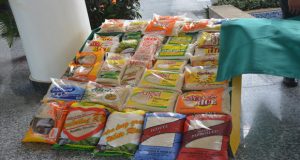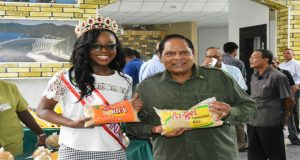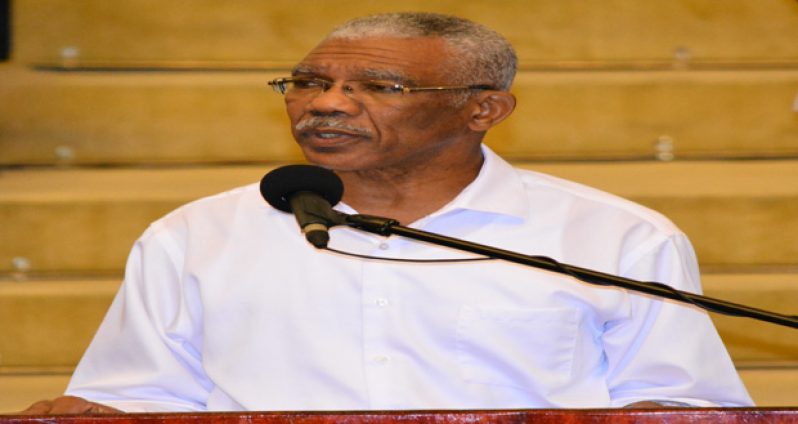THE rice industry is going through a challenge, not a crisis, contends President David Granger, who affirms that the future of the industry remains “bright” and “rice is too big to fail”.The President expressed these sentiments yesterday at the opening of a National Rice Industry Conference themed: “Sustainable Development amid Challenges” at the Arthur Chung Convention  Centre at Liliendall, Greater Georgetown (formerly The Guyana International Convention Centre).
Centre at Liliendall, Greater Georgetown (formerly The Guyana International Convention Centre).
Farmers in recent times have protested the current state of the industry which has been affected by a host of problems, including late payment from millers, poor prices for their paddy and insufficient markets for their produce.
Addressing scores of rice farmers and other stakeholders throughout Guyana, President Granger assured that “what is good for rice is good for Guyana.”
CONSULTATION
He also noted that the challenges facing the industry can only be overcome through consultation.
“We don’t need confrontation, we don’t need demonstration; what we need are solutions to this aged-old problem. We need rice and we need to ensure that rice production is conducted in an efficient manner,” he said.
The President told the gathering of rice farmers, millers and other stakeholders that his Administration wants to bring an end to their anxiety and apprehensions, and focus their energies towards increasing competitiveness.
Acknowledging that Guyana is a minor rice producer on the world market, he noted that the country has been making strides as it has been moving closer to achieving the 1 million tonne mark.
But the Head of State said that as a main pillar in the agriculture sector, Guyana has to do more in finding new markets, given that farmers have demonstrated their capacity to improve production.
VOLATILE INT’L MARKET

The President underscoring the importance of increasing competitiveness, said although rice has been resilient enough to survive floods, droughts and pests, it will not be able to survive a volatile international market unless changes are made to the current ways of doing things.
Guyana needs to address the challenges of marketing, storage, transportation and production costs, he said.
“Manufacturers must also explore the prospects of new value-added products, dealers and vendors must increase the competitiveness of our rice, farmers must reduce the cost of production, the cost of transportation and storage, all of these costs are too high and contribute to making Guyana’s rice too expensive and uncompetitive,” Mr Granger told the conference.
These challenges, he said, must be addressed as well as challenges in the fields, offices, wharfs and laboratories.
The President said his Administration will continue to support farmers in accessing higher yielding varieties, but pointed out that if production cost is not reduced, Guyana will be losing its markets.
Guyana exports more than 75 per cent of the rice it produces to more than 40 different countries, but these markets are not guaranteed, Mr Granger noted.

“We will have to continue to find new markets to overcome barriers to market access. We want to practise what we call economic diplomacy — we have been good at selling rum — we must also be good at selling rice. This Administration will use its Foreign Service to continue to open new markets for rice, but more importantly, private exporters must demonstrate their own capability, capacity to penetrate foreign markets for rice,” the President said.
NO LOOKING BACK
He also said that his Government is not looking back at the uneasy past but to the future of the rice industry with the aim of improving relations among key stakeholders.
This, he said, will be done through consultation, collaboration and a deeper comprehension of the problems facing the industry.
Tension in the industry, he said, will be counterproductive, adding that challenges can only be overcome through cooperation – a common approach in national interest.
“All the challenges facing the industry in Guyana can be successfully addressed. I am confident in the future for rice because it is an industry that already has demonstrated its position of the expertise, of experience and particularly enterprise, the spirit of entrepreneurship,” Mr Granger said.
CLAIMS DEBUNKED
He also debunked claims that the industry is on the verge of collapse, contending that the industry is facing challenges as a result of years of neglect, institutional decay and some bad decisions.
“We must make those challenges into opportunities for change,” he said as he expressed confidence that the conference will lay the groundwork to overcome the shortcomings facing the rice sector.
The forum was a fulfilment of a promise by the APNU+AFC coalition in its 100-day plan to come up with solutions to address challenges confronting the rice industry.

In affirming that the rice industry is too big to fail, the President said the sector holds an important place in Guyana’s history, society and economy.
The rice industry plays a key role in rural development and sustains the livelihood of about 20 per cent of the population. It creates jobs for thousands of Guyanese and is the only source of income for hundreds of farmers.
Rice exports in 2014 amounted to US$249.5 million (22.4 per cent of total exports). The industry has also helped to make Guyana a food-secure nation.
In addition, in recent years, Guyana has begun the promotion of upland rice to a commercial scale, beginning with the Moco Moco rice and Sante Fe rice projects in the Rupununi, Region 9.




.png)









